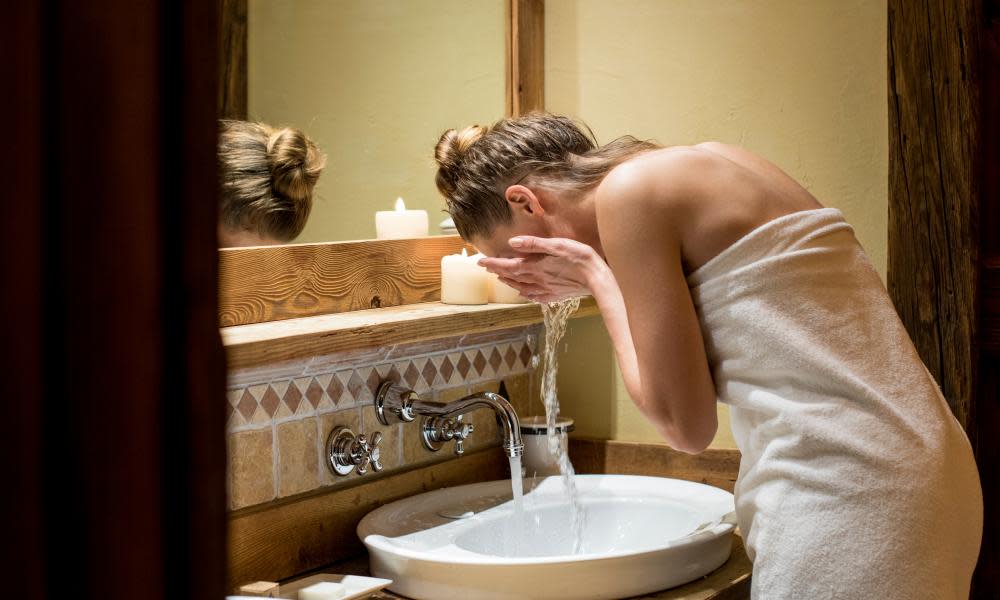'My skin was bright red': 'compromised' facial mask recalled after users report burns

When Heather Waldon applied a beauty product called the Jet Lag Mask to her face, it didn’t take long to realise something was wrong. “Three minutes in, I looked at myself in the mirror … and my skin was bright red,” she told Guardian Australia. “It was so hot. I was like, this cannot be normal.”
Waldon’s experience echoes those of a number of Australian consumers who have used the Jet Lag Mask, which is made by US skincare company Summer Fridays. In online reviews and on social media, customers have reported suffering facial burns from the product, with many comparing their reactions to bad sunburn. Some say the mask caused hives, and swollen or “red raw” skin. While Waldon’s reaction eased after an hour, others said theirs persisted for several days.
On the website of Australian beauty retailer Mecca, where customers can leave reviews, one user said the Jet Lag Mask “should come with a warning”. At the time of publishing, the mask had received 126 one-star reviews on the site, many from customers who reported bad reactions.
In a statement provided to Guardian Australia (and posted on its Instagram account and website), Summer Fridays said some batches of the Jet Lag Mask had been “compromised”. Mecca has removed the product from sale and linked to the Summer Fridays statement on its website.
“We deeply regret any discomfort or inconvenience caused by this issue and are confident that the use of this product does not pose a threat to the health and safety of our customers. We have worked with our manufacturer, testing laboratories and an independent chemist to conduct a thorough investigation into the cause and have determined that certain production batches at our third-party manufacturing site were compromised,” the statement from Summer Fridays reads. Mecca declined to comment to Guardian Australia.
These complaints are an exceptionally widespread consumer response. While beauty products can and do cause adverse reactions, especially in people with sensitive skin, incidents are usually isolated to individuals. It is also rare that consumers would report reactions as extreme as burns.
A small number of customer reviews of a different Summer Fridays product, the Overtime Mask, also report burns. However, a representative from the company has told Guardian Australia it is not aware of any issues relating to that product.
Summer Fridays says it is working with retail partners to return specific lot codes of the Jet Lag Mask and that it will offer purchasers refunds. The company also says it is working on a “minor reformulation” of the mask, including the removal of essential oils.
The current Jet Lag Mask formulation includes the active ingredients vitamin C and niacinamide, a form of vitamin B-3, as well as peppermint oil. The latter is something that Shreya Andric, a dermatologist at Northern Sydney Dermatology, says can often cause adverse reactions, even when batches aren’t “compromised”.
“Peppermint oil sounds soothing in theory, but botanicals are common allergens,” she tells Guardian Australia. “People are often allergic to those natural ingredients – peppermint, aloe vera, things like that.”
While Summer Fridays is working to resolve problems with its Jet Lag Mask, the complaints highlight how beauty products fall into a regulation grey area in Australia.
The Therapeutic Goods Administration (TGA) does not usually regulate the sale of skincare products in Australia, except for those presented as therapeutic goods, such as sunscreen. In a statement provided to Guardian Australia, a TGA spokesperson confirmed the Summer Fridays Jet Lag Mask was not included in the Australian Register of Therapeutic Goods.
Related: Sleeping beauty halls: how Covid-19 upended the 'lipstick index'
That means the safest approach for cautious beauty consumers is to do a “repeat open application test” with new products prior to use. Andric says consumers can do this test by applying a product to their inner, upper arm every day, for five to seven days, and monitor for any reaction.
She says a patch test, a single application followed by a 24-hour wait for any reaction – the method many beauty brands tell consumers to use to test products – is not normally long enough to know whether you’ll develop a bad reaction.
“It’s not something that I would do for every single product,” Andric admits. But the experiences of consumers who used the Summer Fridays Jet Lag Mask show that additional caution can be worthwhile.


